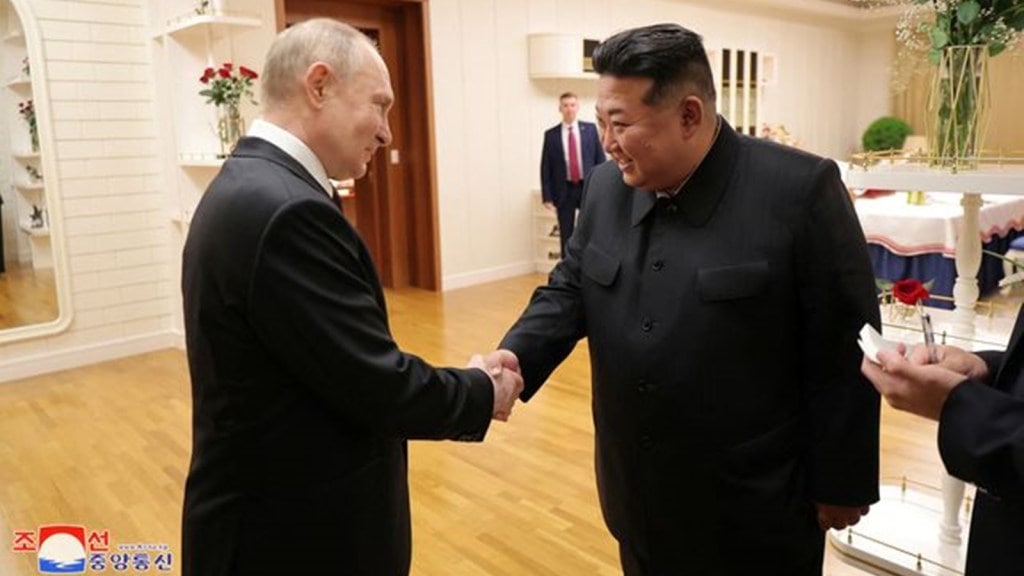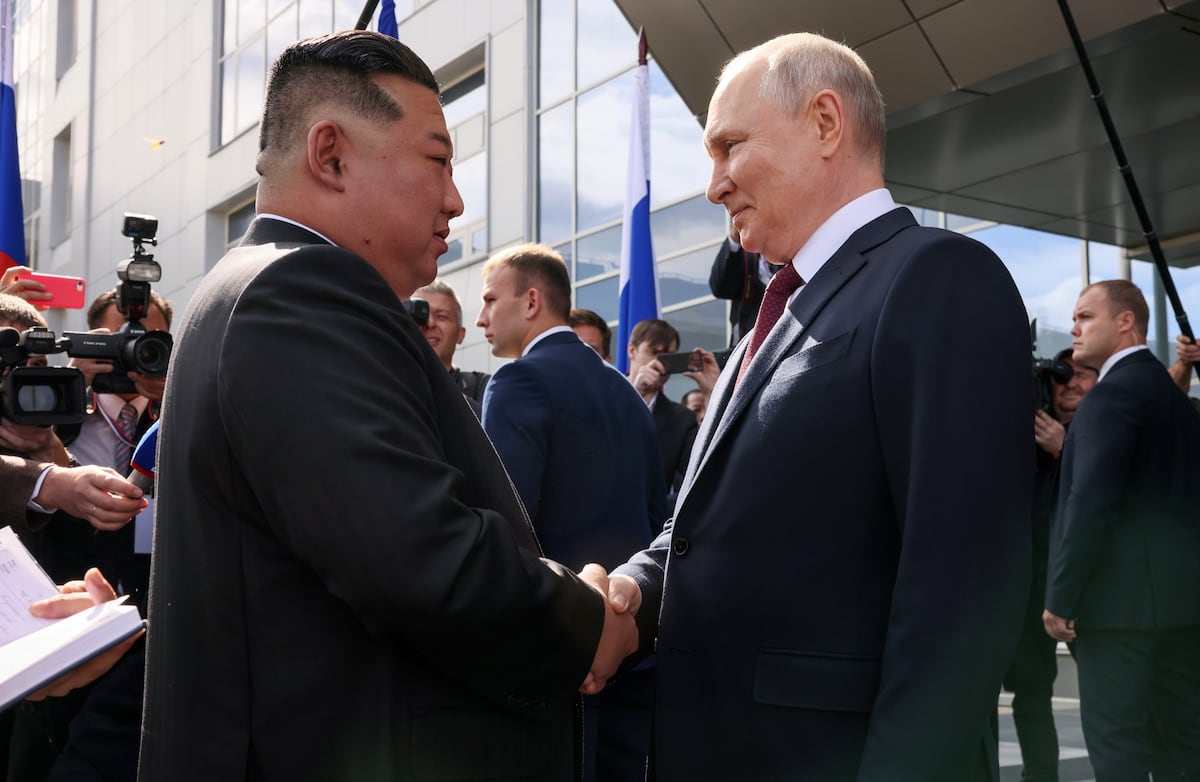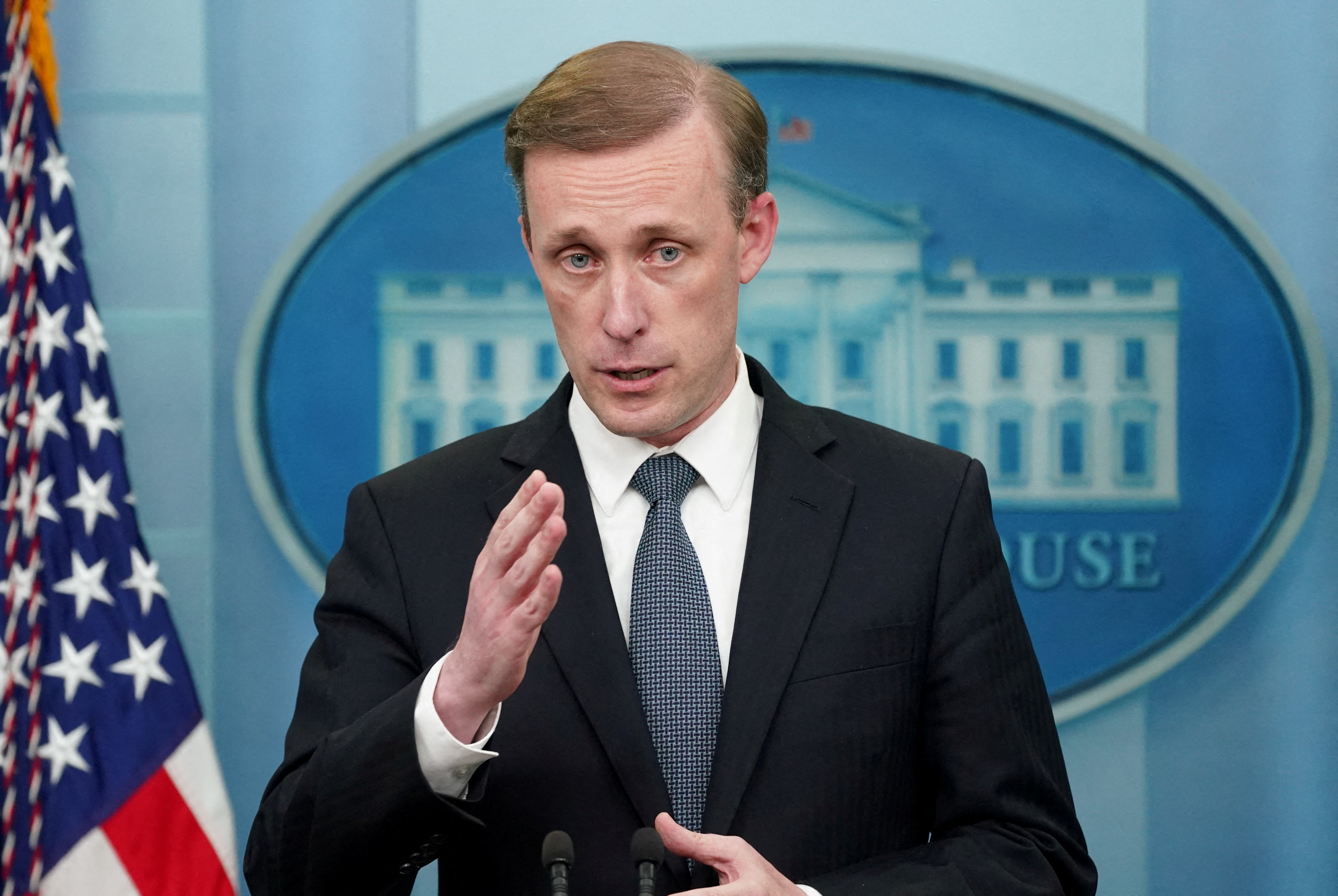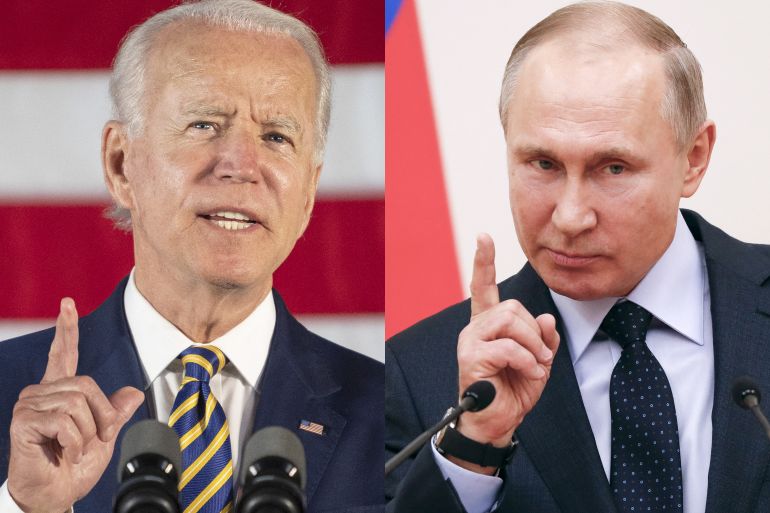NATO Like Alliance Between Russia And North Korea, Sign Pact To Give All Available Military Help If Other Is Attacked; Putin’s Surprise Visit To Vietnam; Putin’s Footprints And What This Means For The United States And The Rest Of The World?

To say Russian President Vladimir Putin’s visits to North Korea and later a “surprise” visit to Vietnam is nothing short of a decisive strategy, a strategy that is likely to give much stress to the United States and a clear sign to the rest of the world.
This key agreement, with the pact signed by the leaders of both nations, was solidified during President Putin’s first visit to North Korea in 24 years.
The pledge is viewed as a revival of a mutual defence agreement under a 1961 treaty established by the Cold War allies, which was annulled in 1990 when the Soviet Union began diplomatic relations with South Korea.
The “comprehensive strategic partnership” agreement signed by President Putin and Kim Jong Un on Wednesday marks one of Moscow’s most significant moves in Asia in recent years.
Article 4 of the agreement states, “If either side faces an armed invasion and is in a state of war, the other side will immediately use all available means to provide military and other assistance in accordance with Article 51 of the U.N. Charter and the laws of each country.”
Article 51 of the U.N. Charter allows a member country to take individual or collective self-defense actions.
 The Western Isolation Leads To Alliances
The Western Isolation Leads To Alliances
The leaders of Russia and North Korea, both increasingly isolated internationally, made this pledge amidst growing concerns from the United States and its Asian allies about the extent of Russia’s support for North Korea, the only country to have tested a nuclear weapon this century.
Kim Jong Un echoed Putin’s sentiments, explicitly linking their strengthened ties to combating the “hegemonic and imperialist” policies of the West, particularly the United States, and its support for Ukraine.
The importance of this treaty can be gauged by its stipulation that neither side will sign any treaty with a third country that infringes on the other’s interests and will not allow its territory to be used by any country to harm the other’s security and sovereignty.
KCNA added that the two countries will undertake joint actions aimed at “strengthening defense capabilities to prevent war and ensure regional and international peace and security.”
Reactions From The World
South Korea and the White House have not yet commented on the reported content of the agreement. At the same time, Japan has expressed “grave concerns” regarding Putin’s openness to cooperation with Pyongyang on military technology.
China, the North’s primary political and economic benefactor, has reacted mutedly.
However, Washington and Seoul are increasingly alarmed by the deepening military cooperation between Russia and North Korea and have accused the two countries of violating international laws by trading arms for use in Moscow’s war against Ukraine.
Ukrainian officials have reported finding North Korean missile debris within their country; however, both Russia and North Korea deny any arms trade between them.
Ukrainian presidential aide Mykhailo Podolyak stated that Russia, a U.N. Security Council permanent member, has allowed “the most brazen nullification” of all sanctions imposed on North Korea to halt its weapons development.
NATO Secretary General Jens Stoltenberg remarked that the pact indicates the alignment of authoritarian powers.
 From Isolation To Mutual Friendship
From Isolation To Mutual Friendship
During his first visit to Pyongyang since 2000, Putin thanked Kim for his support of Russian policy, while Kim reaffirmed his “unconditional” and unwavering support for “all of Russia’s policies,” including Putin’s war in Ukraine.
On Thursday, KCNA released the full text of the agreement, which also includes cooperation on nuclear energy, space exploration, and food and energy security.
Cha Du Hyeogn, a former South Korean government official and now a fellow at the Asan Institute for Policy Studies in Seoul, noted that the mutual defense pledge is similar to the one in the 1961 treaty between North Korea and the Soviet Union.
However, he pointed out that the reference to the U.N. Charter and each country’s laws is open to interpretation, and it is unclear whether the agreement constitutes a formal alliance.
“It reflects Kim’s desire to secure everything in this agreement, while Putin appears reluctant to fully commit,” Cha said.
 Putin Arrives in Vietnam, Displeasing America
Putin Arrives in Vietnam, Displeasing America
Following a historic visit to North Korea, Russian President Vladimir Putin arrived in Vietnam, the final stop of his two-nation tour of Asia.
Putin’s plane landed at Hanoi airport, where he was welcomed on a red carpet by Vietnamese Deputy Prime Minister Tran Hong Ha and top party diplomat Le Hoai Trung.
The visit attracted significant international attention, particularly after the United States expressed displeasure with Vietnam’s decision to invite Putin. This visit marks Putin’s first trip to Vietnam since 2017, during which he sought to enhance economic ties with the Asian nation.
What’s on the Agenda?
During his visit, Putin is scheduled to meet with Communist Party leader Nguyen Phu Trong, State President To Lam, and Prime Minister Pham Minh Chinh.
He is also expected to attend a wreath-laying ceremony at the Ho Chi Minh Mausoleum, which houses the embalmed remains of Vietnam’s founding leader.
Prior to the visit, the Kremlin stated that Putin would focus on strengthening ties with Vietnam in the economic, education, and energy sectors. Discussions are also likely to include Ukraine and defense cooperation.
The two nations have maintained strong ties since the 1950s, with Moscow being Hanoi’s primary arms supplier for decades.
In an opinion piece before his visit, Putin praised Vietnam for supporting a “pragmatic way to solve the crisis” in Ukraine. He also highlighted progress in the areas of payments, energy, and trade between the two countries.
Diplomatic Dynamics
While North Korea remains isolated, Vietnam has maintained diplomatic ties with the West.
Last September, US President Joe Biden visited Hanoi as his administration aimed to develop Vietnam as an alternative supplier of key hi-tech components, reducing American dependence on China.
Vladimir Putin’s first visit to North Korea in nearly 25 years has been closely scrutinized worldwide, and Russia was aware of the global attention, and the message was clear.
Putin, having been excluded from many recent international gatherings and facing potential arrest in much of the world due to an International Criminal Court warrant over his invasion of Ukraine, received a warm welcome in Pyongyang on Wednesday.
Children waved Russian flags, Putin’s giant portrait adorned one side of Kim Il Sung Square, and Russian state media broadcast footage showing posters of Putin lining the streets.
This spectacle clearly signalled to the world that Putin is not isolated and that his influence is still valued in certain regions. In contrast to his interactions in China, where he might be seen as the junior partner, Putin’s status in North Korea was unchallenged.
Both leaders’ rhetoric and the “comprehensive strategic partnership pact” they signed underscored their shared goal of opposing what Putin called “the imperialist policy of the United States and its satellites.”
Putin accused the West of violating its “international responsibilities” by supplying F-16s and other weapons to Ukraine, asserting that Russia “does not rule out the development of military-technical cooperation with the DPRK in accordance with the document signed today.”
Strategic Questions
 If this is a collective defense pact, does Russia’s nuclear deterrent now extend to North Korea, and vice versa?
If this is a collective defense pact, does Russia’s nuclear deterrent now extend to North Korea, and vice versa?
Will “military-technical cooperation” involve joint military drills and the establishment of joint forces to protect their borders?
Who else might join this pact in the future?
“In a sense, this is laying out what they have already been building up in recent months and years,” said Jo Bee-yun, Associate Research Fellow at the Korea Institute for Defense Analyses.
“But I would definitely say this clause is very alarming. Because it’s at the initial stage, depending on how things roll out, they would, if I were them, interpret the clause according to their needs.”
Immediate Concerns
A more immediate concern is that “military-technical cooperation” could mean more shells and missiles from North Korean factories reaching the front lines in Ukraine.
Both Moscow and Pyongyang have denied this is happening, but Russia, having once supported UN sanctions preventing North Korea from exporting weapons, used this opportunity to denounce these “politically motivated sanctions” again.
In March, Russia had already leveraged its position on the UN Security Council to end the mandate of a panel monitoring North Korean sanctions violations.
 Media And Political Reactions, And Broader Strategy
Media And Political Reactions, And Broader Strategy
Russian state media seized the opportunity to provoke the West.
“The West admits terrible concern around Putin’s visit to North Korea,” read a headline in Moskovsky Komsomolets, a national daily newspaper, on Tuesday.
“What difference does it make to the Americans if we talk to our neighbor [North Korea]? Why are you getting so worked up?” taunted top Kremlin propagandist Vladimir Solovyov on his Tuesday night talk show, before adding, less reassuringly, “We are already living in a Third World War.”
Solovyov’s comment perhaps reveals another part of Moscow’s strategy: Russia may have calculated that its own nuclear saber-rattling is no longer enough to prevent the West from increasing aid to Ukraine.
The meeting with Kim Jong Un and this “breakthrough” pact coincide with the arrival of long-awaited US weapons in Ukraine and the lifting of some restrictions on their use against Russia.
Russia also needs weapons to sustain its strategy of exhausting and defeating Ukraine. While it may not be in Russia’s strategic interest to explicitly fund or provide technology to expand North Korea’s nuclear arsenal—and risk upsetting China—it may want the West to believe it is willing to do so.
 Significance of These Visits for the US and the Rest of the World
Significance of These Visits for the US and the Rest of the World
Vladimir Putin’s visits to North Korea and Vietnam carry significant implications for the United States and the international community.
For the United States, the visits signal a closer alliance between Russia and North Korea, which is likely to escalate tensions with the US.
The possibility of enhanced military cooperation, including the potential extension of Russia’s nuclear deterrent to North Korea, presents a direct challenge to US influence and security interests in the region.
The US has been working to strengthen ties with Vietnam as a counterbalance to China’s growing influence. Putin’s visit to Vietnam complicates this effort, potentially undermining US strategies to build regional alliances and reduce dependence on China.
Likewise, the pledge of military-technical cooperation between Russia and North Korea raises concerns about the proliferation of advanced weapons and technology which could include the transfer of missiles and other military hardware to conflict zones, such as Ukraine, challenging US and allied efforts to support Ukraine and maintain regional stability.
Another point of consideration for America would be that Putin’s engagement with North Korea, despite existing UN sanctions, shows Russia’s willingness to flout international norms, damaging the global sanctions regime and presenting a diplomatic challenge for the US in rallying international support for measures against Russia and North Korea.
 For the Rest of the World
For the Rest of the World
These visits also signify a realignment of global alliances, with Russia seeking to solidify ties with countries like North Korea and Vietnam, which could shift and influence the balance of power in Asia and beyond, affecting global political and economic stability.
Any prospects of enhanced military cooperation between Russia and North Korea could destabilize the Korean Peninsula and the broader region and could start an arms race, as countries like South Korea and Japan, already wary of North Korea’s nuclear ambitions, may feel forced to strengthen their own defence capabilities.
Russia’s outreach to Vietnam, a key player in global supply chains, may also affect international trade dynamics. Growing Russian influence in Vietnam could impact the flow of hi-tech components and other critical goods, with potential repercussions for global markets and industries already stressed due to China’s dominance.
The Last Horizon
Putin’s visits to North Korea and Vietnam symbolise a strategic manoeuvre to strengthen alliances and counter Western influence, which could lead to significant geopolitical, security, and economic challenges for the United States and the broader international community.




